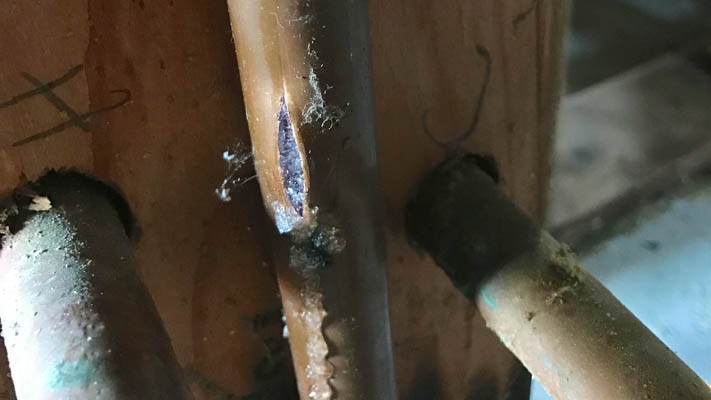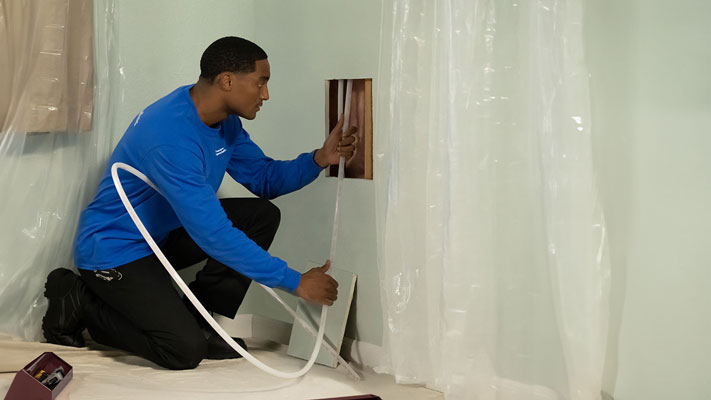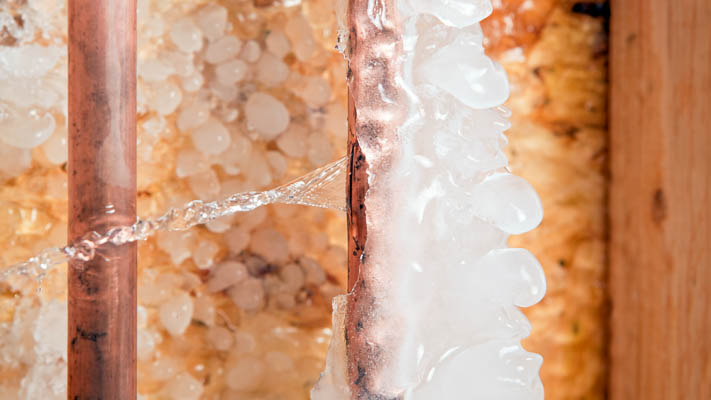Why Is Winterizing Plumbing Important in Texas?
Texas may not be known for harsh winters, but the 2021 Texas Freeze taught us all a valuable lesson: freezing temperatures can strike unexpectedly, causing devastating plumbing issues.
Many Texas homes were unprepared for the sudden drop in temperature, resulting in burst pipes, water damage, and costly repairs. Winterizing your plumbing is essential to avoid these problems and protect your home from extreme weather conditions.

One of the primary reasons winterizing is so critical in Texas is the state's infrastructure. Unlike homes in colder climates, many Texas homes have plumbing systems installed in uninsulated areas, making these vulnerable pipes more prone to freezing. Additionally, many pipe materials used in homes across the state failed due to their inability to accommodate cold conditions. We have a breakdown of the effects of the Texas Freeze on pipe materials.
Winterizing your plumbing isn't just about avoiding a single freeze event; it's about being prepared for any sudden temperature changes. Whether it's sealing drafts, insulating pipes, or repiping with more freeze-resistant materials, these small steps can save you from significant headaches and financial burdens down the line.
How Can You Tell If Pipes Are Frozen?
Identifying frozen pipes early can prevent a minor inconvenience from becoming a major disaster. There are a few telltale signs that your pipes may have frozen:
- Little to No Water Flow: If you turn on a faucet and notice a significant reduction in water flow or no water at all, this could indicate a frozen pipe.
- Strange Noises: Listen for unusual sounds such as banging, clanking, or gurgling coming from your pipes. These noises often occur when water is attempting to move through ice blockages.
- Frost on Pipes: Visible frost or ice on exposed pipes is a clear indication that freezing has occurred. This is particularly common in uninsulated areas like attics or crawl spaces.
If you suspect your pipes are frozen, it is important to act quickly to minimize potential damage.
Should I Turn Off Water If Pipes Are Frozen?
Turning off the water supply is a key step if you suspect your pipes are frozen. This helps to minimise pressure build-up within the pipes, which is one of the main reasons pipes burst during freezing conditions.
When water freezes inside a pipe, it expands and creates a plug that can trap unfrozen water. This trapped water builds pressure as it tries to flow, potentially causing the pipe to break and fail. Similarly, if water freezes lengthwise along the pipe's inner surface, the trapped water can experience significantly increased pressure.
Once the water supply is turned off, it's essential to locate the frozen section of the pipe and begin thawing it carefully using a hair dryer, heating pad, or warm towels. Never use an open flame or blowtorch, as this can damage the pipes and create a fire hazard.
After addressing the frozen section, turn the water supply back on slowly. If you notice any further issues, it might be a sign that your pipes are leaking or damaged.
What Is the Best Pipe Installation to Prevent Freezing?
Proper pipe installation is crucial for preventing freezing in Texas homes, especially after the lessons learned from the Texas Freeze. Here are some best practices:
- Rerouting Pipes: Pipes running through uninsulated spaces like attics or crawl spaces are at high risk during freezes. Rerouting these pipes through interior walls or other insulated areas can significantly reduce the likelihood of freezing.
- Insulating Pipes: Using foam insulation sleeves or tape to cover exposed pipes can help maintain their temperature. Focus on pipes located in basements, attics, or exterior walls, as these areas are most vulnerable.
- Adding Heat Tape: Heat tape provides consistent warmth to pipes, especially in uninsulated areas. It's an effective way to prevent freezing but should be installed by a professional to ensure safety.
- Consider Repiping Outdated or Rigid Materials: Replacing outdated materials like galvanized plumbing, or more rigid pipes such as CPVC is a proactive approach to freeze prevention. Even traditionally reliable materials like copper are more susceptible to freezing temperatures due to the rapid expansion and contraction created by severe temperature fluctuations.
By combining these methods, you can ensure your plumbing is better equipped to handle unexpected cold weather.
What Is the Best Pipe Material for Texas Winter?
PEX piping is widely regarded as the best material for winterizing your home. For a more detailed breakdown, read our article on the benefits of PEX in freezing weather. Here's why we recommend PEX tubing for homes experiencing freezing temperatures:
- Flexibility: Unlike more rigid materials like copper or CPVC, PEX can expand slightly when water freezes inside it. This flexibility reduces the risk of cracking or bursting, making it ideal for homes in areas prone to sudden temperature drops. Additionally, PEX can be routed through insulated spaces to ensure it is better protected.
- Low Thermal Conductivity: PEX transfers heat more slowly than materials like copper, meaning it takes longer for the water inside to freeze. This extra time can be critical during short freeze events.
- Fewer Fittings: PEX piping requires fewer connections and joints, which are common points of failure in freezing conditions. The long, continuous runs of PEX make it more resilient.

While no material is entirely freeze-proof, PEX provides a level of durability unmatched by other options, ensuring your peace of mind during sudden freezing temperatures in Texas.
If you're considering a repipe for your Texas home, PEX is the smart choice for winter preparation. Contact us to receive a free, fixed-price repipe quote from one of our local repipe consultants.
Get your free estimate today
With over 75,000 repipes completed, we've perfected our One-Stop Repipe™ for your home.
Receive a Free Plumbing Quote to Winterize Your Home
Here at Repipe Specialists, we've fully replaced the plumbing in many Texas homes using PEX tubing. We continually get positive customer feedback from customers about their overall home repipe experiences. We often exceed their expectations on:
- Speed: Our repipe crews typically complete a repipe in a day, returning on another day for wall patching.
- Convenience: Through our One-Stop Repipe™ Process, we handle everything from permits, to wall patching, to inspections.
- Cleanliness: Our crews are trained to protect your home while working (we cover all surfaces with protective sheeting), and to clean up fully at the end of each day.
- Peace of Mind: Repipe Specialists is a fully licensed plumber in every state we operate in, and we back all of our repipes with a lifetime warranty.
- Financing programs: To help take the sting out of unplanned repipe expenses, we offer several financing programs.
- Price: As a specialist that performs hundreds of repipes a week, we can deliver high-quality repipes at a lower cost vs generalist plumbers. Our quotes typically range from $4,500 to $15,000 depending on the size and complexity of your project. We have an article that covers repipe cost factors in detail.
Schedule a free in-home consult, and one of our local repipe consultants will explain all your repipe options and provide you with a written, fixed-price quote. Beat the Texas freeze, repipe with PEX.

